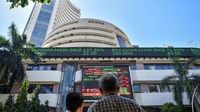On May 7, 2025, India executed "Operation Sindoor," targeting terrorist infrastructure in Pakistan and Pakistan-occupied Jammu and Kashmir (PoK). This operation was a direct response to the recent terror attack in Pahalgam that claimed the lives of 26 tourists. The Indian Army confirmed that nine strategically selected sites, identified as hubs for planning cross-border terror operations, were struck. The government emphasized that the operation was "focused, measured, and non-escalatory," aiming to avoid escalating tensions while delivering a decisive blow to terrorist capabilities.
The geopolitical tensions resulting from this operation have had immediate repercussions on the Indian stock market. Early trading on the same day saw benchmark indices, including the BSE Sensex and NSE Nifty-50, swinging between red and green. The BSE Sensex closed down 0.2%, or 155.7 points, at 80,641, while the NSE Nifty-50 slipped 0.3%, or 81.55 points, to end at 24,379. Analysts noted that the geopolitical developments have brought a halt to the strong market rally witnessed over the past 15-16 days.
"The geopolitical tensions between India and Pakistan have put a halt to the strong market rally seen in the past 15-16 days," stated Shrikant Chouhan, Head of Equity Research at Kotak Securities. This sentiment was echoed by VK Vijayakumar, Chief Investment Strategist at Geojit Investments, who remarked, "What stands out in 'Operation Sindoor' from the market perspective is its focused and non-escalatory nature. We have to wait and watch how the enemy reacts to these precision strikes by India."
Despite the market's negative start, analysts believe that the sustained buying by foreign portfolio investors (FPIs) could provide resilience. On May 6, FPIs were net buyers worth ₹3,795 crore, while domestic institutional investors (DIIs) sold equities worth ₹1,398 crore. This buying trend, coupled with global macroeconomic factors such as a weak dollar and slower growth in the US and China, has kept the market somewhat buoyant.
However, the immediate impact of the operation on the stock market remains uncertain. Anand Rathi, in a recent note, observed that even in the event of significant escalation, the Nifty is unlikely to decline by more than 5-10%. Historical patterns indicate that the Nifty typically does not fall more than 2% during heightened tensions with Pakistan, except during significant events like the 2001 Parliament attack, which saw a sharper market drop of 13.9%.
Market volatility was evident as several sectors reacted to the news of the operation. Shares of state-run banks were among the top laggards, with the Nifty PSU Bank index plunging 4.8% on May 6. Bank of Baroda, for instance, saw its shares drop by 10.9% after its fourth-quarter results fell below market expectations. Other PSU banks such as Bank of India, Union Bank, and Canara Bank also experienced declines ranging from 5% to 7%.
In contrast, some sectors showed resilience. Defence stocks gained traction, with shares of Hindustan Aeronautics, Bharat Electronics, and Bharat Dynamics seeing upward movement as investors reacted positively to the operation. Specifically, Mazagon Dock Shipbuilders and Garden Reach Shipbuilders each saw their share prices jump by 3.1% intraday, while Cochin Shipyard's stock price rose by 2%.
As the market digests the implications of "Operation Sindoor," investors are also looking ahead to the outcome of the US Federal Reserve's rate-setting meeting on May 7. While the Fed is expected to keep interest rates unchanged, Chair Jerome Powell's assessment of inflation and economic growth could influence market trends in the near term.
The Indian Rupee also felt the pressure from the heightened tensions, opening 18 paise weaker at 84.62 against the US dollar, compared to the previous day's close of 84.44. Additionally, precautionary measures taken by the Indian government led to the cancellation of all flights to and from several northern cities, including Jammu, Srinagar, and Amritsar, until noon on May 7.
In other news, the India-UK Free Trade Agreement (FTA) discussions concluded on May 6, 2025, which could have implications for various sectors, particularly textiles. The elimination of the 8-12% UK import duty on textiles is expected to make Indian exports more competitive.
As the situation unfolds, market participants will continue to monitor developments on the border and their potential impact on the Indian economy and stock market. The outcome of these geopolitical events, alongside global market cues, will play a crucial role in shaping investor sentiment in the coming days.
In summary, while the immediate aftermath of "Operation Sindoor" has led to market volatility and cautious sentiment among investors, the sustained buying by foreign investors and the resilience of certain sectors may help mitigate the overall impact. The situation remains fluid, and investors are urged to stay informed as developments continue to unfold.







